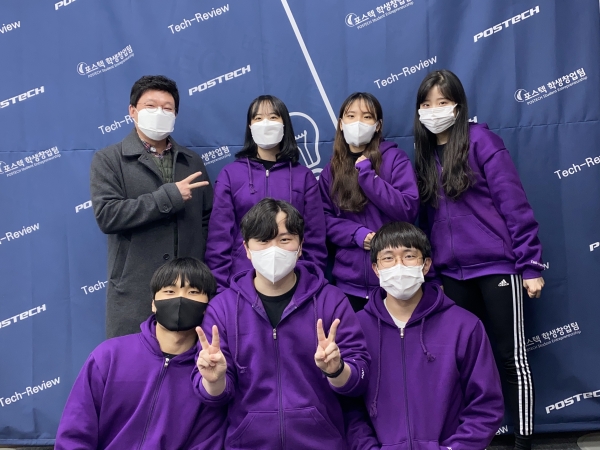
POSTECH Tech-Review (Tech-Review) hosted its first Techaton on Zoom from Jan. 30 to 31. The event was held in order to help Postechians create business models based on promising technologies, ultimately raising interest in launching technology-based startups. Out of the 14 speakers who gave lectures at the 2020 Tech-Review technology startup seminars and networking sessions, Tech-Review invited five speakers as technological mentors to the Techaton. Each of the mentors’ lecture topics was assigned to a team as its target business product. During the Techaton, five teams, each comprised of five POSTECH undergraduates, drew up a detailed business plan of their product within a two-day time frame.
When organizing the Techaton, Tech-Review concentrated on “creating a rich event where Postechians could gain not only visible outcomes but also internal ones,” explained Kang Doo-kyeong (CSE 19), a member of the Tech-Review management team. Speakers with expertise in technology shared ideas that could be applied to business planning, while participants gained knowledge and insight on novel technology and learned how to develop a business. Throughout this process, Tech-Review placed several stepping stones for the participants. Tech-Review invited two instructors to give a lecture on how to design a business model and create a business plan. In addition, they allotted a discussion session for the technological mentors and teams so that the participants could develop their ideas effectively with the help of an expert’s advice.
“There were quite a few difficulties during the preparation for the Techaton,” Kang said. “After all, it was a first-time event for Tech-Review. On top of that, the event was held online, which increased the uncertainty in recruiting technological mentors and participants.” Kang also mentioned that dealing with the unpredictable conditions in the five Zoom breakout rooms had been tough for Tech-Review. “We had to be meticulous to tackle these obstacles. From one week in advance, we met every day to rehearse the ice breaker time and each team session. We also kept in touch with Student Entrepreneurship, instructors, and technological mentors.” These efforts paid off and resulted in a successful, well-organized event where Postechians could acquire valuable information about technology-based startups.
Three out of five teams were awarded for their performance at the Techaton. First place went to the team of Park Jae-wan (CHEM 18), Sim Chae-hyeon (EEE 19), Nam Su-heon (CiTE 20), Song Dong-gi (Mueunjae 20), and Je Tae-ho (Mueunjae 20). Their base technology was a “deepfake generation prevention service using deep learning adversarial attacks”. “Deepfake technology has just come into the spotlight, and we predicted that there would be a high possibility that deepfake technology could be manipulated in the wrong way,” said Park, the leader of the team. “We intended to develop a technology that could fundamentally block deepfake using the data that is used for deepfake itself. Recently, deepfake detecting services are advancing, but a service that blocks the generation of deepfake in the first place does not exist.” This point differentiated the team in terms of originality and competitiveness.
“The Techaton was an opportunity to understand the market flow and learn that technology shines when there is ascertained demand from customers,” commented Jae-wan. He also mentioned that the instructor’s tips gave great guidance on producing pitching material that could comprehensively deliver their technology to the audience. Lastly, he expressed his astonishment for fellow Postechians’ brilliant imagination and passion, and added, “it was a chance to feel pride as a student of POSTECH.”
Overall, the Techaton was a valuable opportunity for Postechians to experience the development process of technology-based startups. Although it was a first-time event, Techaton was successfully launched, and Postechians actively engaged in the program for two days.


